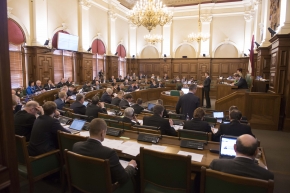 Gallery
Gallery
On Thursday, 3 April, the Saeima in two readings adopted urgent amendments to the Criminal Law. The amendments elaborated by the Legal Affairs Committee of the Saeima provide for criminal liability for failure to comply with the provisional prohibition to sell the so-called legal drugs.
Andrejs Judins, Chairman of the Criminal Law Policy Subcommittee of the Legal Affairs Committee, had previously explained that “until now the wording of the Law allowed the authorities to impose a 12-month provisional prohibition to sell substances that have not yet been included in the list of prohibited substances but that are clearly harmful. Merchants were required to hand over these substances to the police within 10 days; however, the provisions of the Law did not envisage liability in case of a failure to comply with the provisional ban. Therefore, we proposed a prison sentence to be imposed on those who continue selling the lethal substances”.
According to the adopted amendments, a person who violates the provisional prohibition will be held criminally liable and will receive the following possible punishments: a prison sentence of up to 2 years, temporary arrest or community service, or a fine and police supervision for up to 3 years. These sanctions are to be imposed on persons who produce, buy, store, transport, transfer for sale or sell the new types of psychoactive substances or products containing these prohibited or controlled substances.
Judins pointed out during the plenary sitting that the amendments do not envisage any sanctions against persons who use or possess these substances for their own consumption.
If the aforementioned activities have caused severe consequences, the applicable sanctions include a prison sentence of up to 5 years or community service with police supervision for up to 3 years.
“The amendments will serve as a new weapon in the hands of the police in combating the distribution of these extremely dangerous substances. At the same time, we must not forget that this not the only legal tool at our disposal – several municipalities have joined their efforts with the State Police and thus have successfully eradicated the legal trade of the substances. The State Police has a wide range of procedures that can be implemented as a part of a criminal case filed on the grounds of suspicion. Likewise, the Administrative Procedure Law sets forth various courses of action, including seizure of the prohibited substances and fines of up to EUR 1,425,” said the Chairman of the Subcommittee.
Judins also points out that the Saeima is considering the possibility of introducing administrative liability for the use of the psychoactive substances. Furthermore, an appropriate legal approach is being sought to introduce a universally applicable prohibition of psychoactive substances that would cover also those types of substances that have not been yet identified in Latvia.
Judins emphasises that in order to combat these substances effectively, it is of paramount importance to regularly update the list of provisionally prohibited substances so that the prohibition may be applied to the new types of psychoactive substances that are just emerging or are about to emerge in the Latvian market. The amendments will enable the State Police to take more active measures in combating the distribution of the prohibited substances. Admittedly, there is no fast and easy way of resolving this new dimension of substance abuse, which has spread across a number of European countries. The European Union is also discussing the introduction of a joint mechanism for banning the new types of psychoactive substances.
The new provisions will come into force on the day following the proclamation of the amended Criminal Law.
Saeima Press Service







